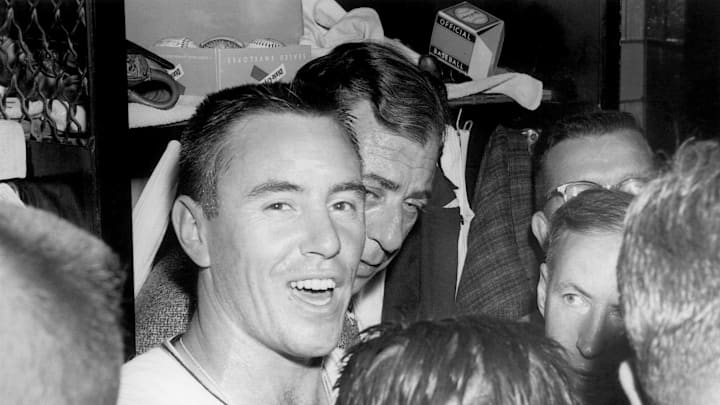4. Rajai Davis, 2016 Cleveland Indians. With the Giants’ Hugh McQuillen earlier on this list, Davis is the only player to have turned the Game Seven odds so dramatically in his team’s favor in a game they eventually lost.
This of course is the Series in which the Chicago Cubs broke their 108-year World Series drought, beating Davis’ Indians 8-7 in 10 innings at Cleveland’s Progressive Field. It would have been much simpler but for Davis.
The Cubs led 6-4 in the eighth inning of that concluding game and were just four outs from their long-awaited championship when Davis came to the plate against Aroldis Chapman with two out and Brandon Guyer at second base.
Davis worked the count to 2-2 on Chapman, then somehow turned around a 100-mph fastball and lifted it just over the wall down the left field line for a stunning, game-tying home run. For Davis, the only problem was that it turned out to be not quite enough. The Cubs won 8-7 on Ben Zobrist’s 10th inning hit. Davis Win Probability Added: 39 percent.
3. Tony Womack, 2001 Arizona Diamondbacks. The final game of the 2001 World Series between the Arizona Diamondbacks and New York Yankees is another frequently mentioned when the subject of greatest games arises. That game, which Arizona won 3-2, featured a lead change in the eighth inning and another in the ninth, Womack playing a pivotal role.
At Chase Field in Phoenix, the visiting Yankees had broken a 1-1 tie with Alfonso Soriano’s eighth inning home run. Now, with Hall of Fame closer Mariano Rivera on the mound, they sought to wrap it up. Mark Grace, the first hitter, threw a hitch into those plans with a line single, and when Damien Miller attempted to bunt pinch runner David Dellucci into scoring position Rivera threw wildly to second.
An unsuccessful sacrifice later, Womack came up and played his role. On a 2-2 count, he laced a double toward the right field line, pinch runner Midre Cummings scoring the tying run and Jay Bell – who had reached on the forceout of Dellucci at third – went to third.
After Rivera hit Craig Counsell to load the bases, Luis Gonzalez struck the hump-back liner into short center that scored Bell with the championship run. Gonzalez is the one whose hit we celebrate today, but Womack – with the hit that erased New York’s lead – had statistically the more impactful blow. Womack Win Probability Added: 50 percent.
